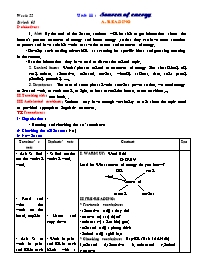Bài soạn môn học Tiếng Anh 11 - Period 65 - Unit 11: Sources of energy - A: Reading

I- objectives:
1. Aim: By the end of the lesson, students will be able to get information about the human's present resources of energy and future energy ,so that they can have more attention to protect and have suitable works to save the nature and resources of energy.
- Develop such reading micro-skills as scanning for specific ideas and guessing meaning in the context.
- Use the information they have read to discuss the related topic.
2. Lexical items: Words/ phrases related to resources of energy like : fossil fuel, oil, coal, exhaut, alternative, released, nuclear, winmill, sailboat, dam, solar panel, plentiful, potential, .
3. Structures: The uses of some phrasal verbs : nuclear power station, we need energy to live and work, to cook meals, to light, to heat or cool the house, to run machines, .
II. Teaching aids: text book, .
III. Anticipated problems: Students may have enough vocabulary to talk about the topic need to provided appropriate linguistic resources.
VI- Procedures:
1- Organization:
- Greeting and checking the sts attendance
2- Checking the old lesson:( No )
Week: 22 Unit 11 : Sources of energy Period: 65 A- READING I- objectives: 1. Aim: By the end of the lesson, students will be able to get information about the human's present resources of energy and future energy ,so that they can have more attention to protect and have suitable works to save the nature and resources of energy. - Develop such reading micro-skills as scanning for specific ideas and guessing meaning in the context. - Use the information they have read to discuss the related topic. 2. Lexical items: Words/ phrases related to resources of energy like : fossil fuel, oil, coal, exhaut, alternative, released, nuclear, winmill, sailboat, dam, solar panel, plentiful, potential, .. 3. Structures: The uses of some phrasal verbs : nuclear power station, we need energy to live and work, to cook meals, to light, to heat or cool the house, to run machines,. II. Teaching aids: text book, . III. Anticipated problems: Students may have enough vocabulary to talk about the topic need to provided appropriate linguistic resources. VI- Procedures: 1- Organization: - Greeting and checking the sts’ attendance 2- Checking the old lesson:( No ) 3- New lesson Teacher’ s acts Students’ acts Content Sup - Ask Ss find out the vertical word. - Read and write the words on the board. explain - Ask Ss to work in pairs and fill in each blank with a suitable word from the vocabulary. - Ask Ss to read the text silently and answer the questions with a partner. -give feedback - Ask Ss to scan the passage to find out the advantages and disadvantages of each alternative source. - Ask Ss to work in groups and take notes their group’s ideas. -listen and remark - Ss find out the vertical word. - - Listen and copy down - Work in pairs and fill in each blank with a suitable word from the vocabulary - Read the text silently and answer the questions with a partner. - copy down - Ss scan the passage to find out the advantages and disadvantages of each alternative source. -A preventative of each group present their group’s ideas. I. WARM UP: Word Grid ENERGY Lead in: What sources of energy do you know? Oil coal wind Source of natural nuclear II. PRE-READING: * Pre-teach vocabulary: - alternative (adj) : thay thế - reserve (n) : sự dự trữ - exhaust (v) : làm kiệt quệ - released (adj) : phóng thích - limited (adj) : giới hạn * Checking vocabulary: Gap-fill (Task 1/125-126) 1.released 2.alternative 3. exhausted 4.limited 4.reserve III. WHILE-READING: * Answer the questions 1. What is our major source of energy? - Our major source of energy is fossil fuels (oil, coal, natural gas) 2. How many sources of energy are mentioned in the text? - The sources of energy mentioned in the text are: Fossil fuels, nuclear energy, geothermal heat, solar energy, wind power, water power. 3. Whish one of do you think is the most potential energy of all the alternative sources of energy? - I think solar energy is the most potential energy of all the alternative sources of energy. * Table Completion Sources of energy Advantages Disadvantages Nuclear energy unlimited Very dangerous Solar energy not only plentiful & infinite but also clean & safe Possible in the day time Water power clean & unlimited Expensive Wind power clean & unlimited No windà no wind energy Geothermal heat avail be possible IV. POST-READING: Discussion Complete the summary of the reading passage. V. HOMEWORK: Revise the reading lesson and prepare the next part.
Tài liệu đính kèm:
 Av11(T65).doc
Av11(T65).doc





